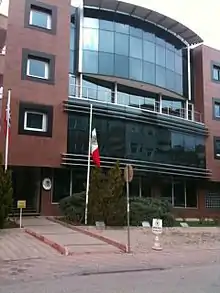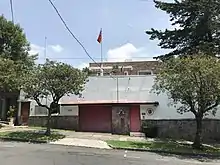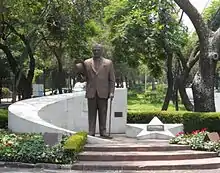Mexico–Turkey relations
Mexico–Turkey relations (Spanish: Las relaciones México-Turquía; Turkish: Meksika-Türkiye ilişkileri) are foreign relations between Mexico and Turkey.
 | |
Mexico |
Turkey |
|---|---|
Country comparison
| Population | 128,649,565 | 83,154,997 |
| Area | 1,972,550 km2 (761,610 sq mi) | 783,356 km2 (302,455 sq mi) |
| Population density | 61/km2 (158/sq mi) | 105/km2 (271.9/sq mi) |
| Capital | Mexico City | Ankara |
| Government | Federal presidential constitutional republic | Unitary presidential constitutional republic |
| Current Leader | President Andrés Manuel López Obrador President of the Senate Mónica Fernández Balboa |
President Recep Tayyip Erdoğan Vice President Fuat Oktay |
| Official languages | Spanish (de facto) | Turkish |
| Main religions | 90.7% Christian, 4.7% No religion | 97.6% Islam, 1.1% Judaism, 0.3% Christianity |
| Ethnic groups | 56 Amerindian groups | 85% Turkish, 9% Kurdish 6% Others |
| Human Development Index (HDI) | 0.767 (high)[1] — 76th | 0.806 (very high)[2] — 59th |
| GDP (PPP) | $2.715 trillion ($21,362 per capita) | $2.464 trillion[3] ($29,326 per capita) |
History
The first official contact between Mexico and the Ottoman Empire (present day Turkey) was 1864 when Emperor Maximilian I of Mexico sent out emissaries to several nations to seek official recognition of his rule in the country.[4] Diplomatic relations between the two nations were established in 1928 after the transformation of Turkey from the Ottoman Empire by Mustafa Kemal Atatürk, founder of the modern Turkish republic in 1923; and after the end of the Mexican revolution in 1920. That same year, both nations signed a 'Friendship Agreement'.[5] Almost immediately, both nations opened diplomatic legations in each other's capitals, respectively.[5]
The diplomat Hasan Tahsin Mayatepek laid the foundation for Mexican-Turkish relations during the 1930s, and had a great influence in the way Mexico, and its indigenous peoples like the Aztecs and Maya peoples are seen in Turkey. The Turkish Embassy in Mexico City opened in 1947.[6] In 1962, their respective diplomatic missions were upgraded to embassies.[5]
In June 1992, Mexican Foreign Secretary Fernando Solana paid an official visit to Turkey, becoming at the time the highest level government official to visit the country. While in Turkey, Secretary Solana and his counterpart, Foreign Minister Suleyman Demirel signed agreements on cultural exchanges and of eliminating visa requirements for diplomatic passport holders of both nations. The two nations also agreed to establish a mechanism for political consultations to discuss points of views on bilateral and multilateral mutual interests.[5] In 1998, Prime Minister Mesut Yılmaz became the first Turkish head-of-state to pay an official visit to Mexico.[7] In 2009, then Prime Minister Recep Tayyip Erdogan paid a visit to Mexico. In 2013, President Enrique Peña Nieto became the first Mexican head-of-state pay a visit to Turkey.[8]
Both nations are considered as regional powers and are playing bigger roles in the international community. Both nations have supported each other diplomatically, particularly in the United Nations and Mexico has supported Turkey over the issue of the Syrian Civil War occurring on its border. In 2013, Mexico donated US$1 million to Turkey for the support of over one million Syrian refugees that are currently being housed in the country.[9] In July 2018, both nations celebrated 90 years of diplomatic relations.[10]
Presidential Visits
| Guest | Host | Place of visit | Date of visit |
|---|---|---|---|
| Çankaya Köşkü, Ankara | December 17, 2013[11] | ||
| Palacio Nacional, Mexico City | February 12, 2015[12] |
Bilateral agreements
Both nations have signed several bilateral agreements, such as a Friendship Agreement (1928); Agreements on Cultural Exchanges (1992); Agreement on Eliminating Visa requirements for Diplomatic Passport holders (1992); Memorandum of Understanding for the Establishment of a Mechanism of Consultation in Matters of Mutual Interest (2013); Agreement on the avoidance of Double-Taxation and Tax Evasion (2013); Customs Agreement (2013); Agreement on Air Transportation (2013); Agreement on the Protection of Investments (2013); Agreement of Cooperation in Combating against Illicit Trafficking in Narcotic Drugs and Psychotropic Substances (2013); Agreement of Cooperation in Combating Organized Crime and Terrorism (2013) and an Agreement in Science and Technical Cooperation (2013).[8]
Trade
In 2018, trade between both nations amounted to US$1.2 billion.[13] Mexico's main exports to Turkey include: wheat, telephones and vehicles. Turkey's exports to Mexico include: textiles, copper and aluminum-based products.[8] Mexican multinational companies such as Cemex, Gruma and Zinc Nacional operate in Turkey and have invested over US$600 million in the country.[14] Turkish multinational companies such as Orphan Holding, Tekno Kauch and Toto Max operate in Mexico.[14]
Resident diplomatic missions
- Mexico has an embassy in Ankara and a consulate in Istanbul.[15]
- Turkey has an embassy in Mexico City.[16]
 Embassy of Mexico in Ankara
Embassy of Mexico in Ankara Embassy of Turkey in Mexico City
Embassy of Turkey in Mexico City
See also
References
- "2019 Human Development Index Ranking | Human Development Reports". hdr.undp.org. Retrieved 2020-08-04.
- "List of countries by Human Development Index", Wikipedia, 2020-04-24, retrieved 2020-05-02
- "International Monetary Fund, Report on selected countries". imf.org. Retrieved 2017-06-24.
- La política exterior de Maximiliano de Habsburgo durante el Segundo Imperio Mexicano (in Spanish)
- History of diplomatic relations between Mexico and Turkey (in Spanish)
- Önsoy, Murat. "Latin America-Turkey Relations: Reaching Out to Distant Shores of the Western Hemisphere" (Chapter 12). In: Ercan, Pınar Gözen (editor) (Haceteppe University). Turkish Foreign Policy: International Relations, Legality and Global Reach. Springer Science+Business Media, April 7, 2017. ISBN 3319504517, 9783319504513. Start: p. 237. CITED: p. 245.
- Prime Minister Mesut Yılmaz on a visit to Mexico (in Spanish)
- Bilateral relations between Mexico and Turkey (in Spanish)
- México donará un million de dollars a Turquía para apoyar a sirios. (in Spanish)
- México y Turquía celebran 90 años de relaciones diplomáticas (in Spanish)
- "Turkish President Gul Meets Pena Nieto".
- "President Erdoğan in Mexico (in Turkish)".
- "Mexican Ministry of the Economy: Turkey (in Spanish)". Archived from the original on 2016-04-25. Retrieved 2017-08-02.
- Inversiones turcas en autopartes se avecinan con TLC (in Spanish)
- Embassy of Mexico in Ankara (in Spanish and Turkish)
- Embassy of Turkey in Mexico City (in Spanish and Turkish)

